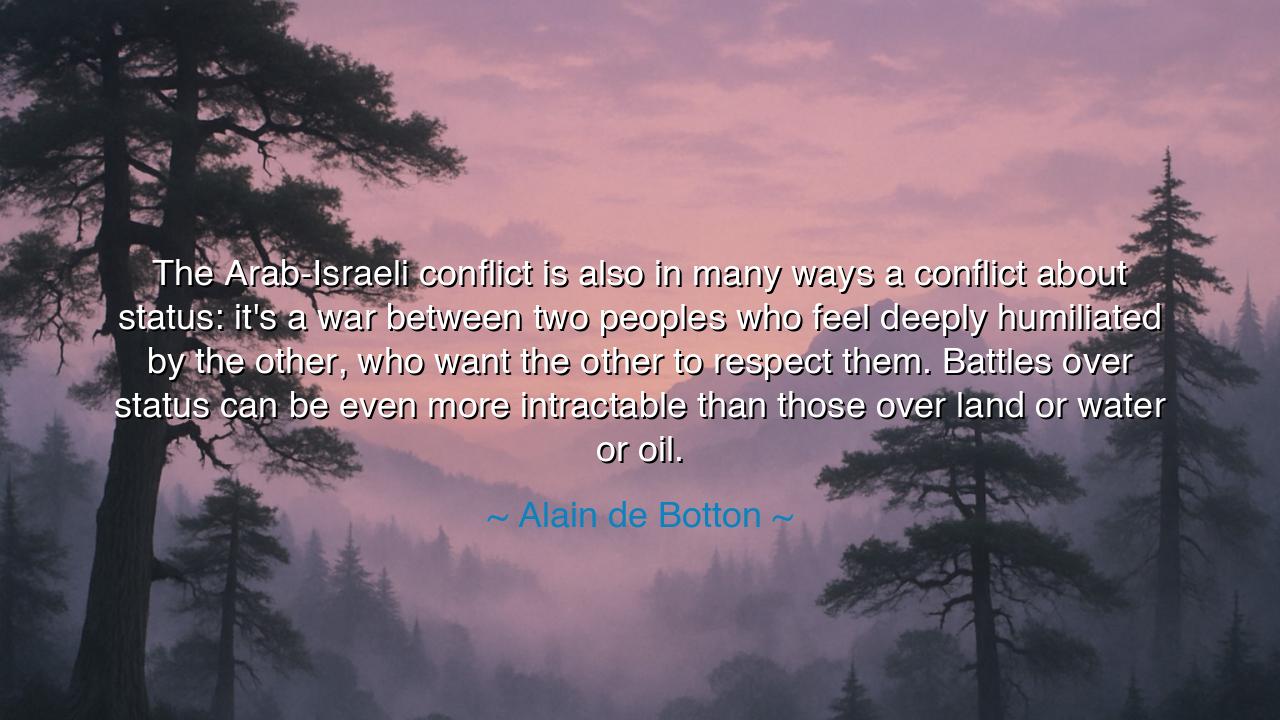
The Arab-Israeli conflict is also in many ways a conflict about
The Arab-Israeli conflict is also in many ways a conflict about status: it's a war between two peoples who feel deeply humiliated by the other, who want the other to respect them. Battles over status can be even more intractable than those over land or water or oil.






Alain de Botton, philosopher of our restless age, spoke with piercing clarity when he declared: “The Arab-Israeli conflict is also in many ways a conflict about status: it's a war between two peoples who feel deeply humiliated by the other, who want the other to respect them. Battles over status can be even more intractable than those over land or water or oil.” In these words lies an ancient truth: the deepest wars are not fought over earth, nor over wealth, but over the invisible treasure of honor and respect. For the land can be divided, and water can be shared, but the wounded pride of nations and peoples is a flame that resists extinguishing.
To understand this is to see beyond the surface of history. The quarrel between Israel and the Arab world has long been told as a struggle over borders, cities, and resources. Yet, as de Botton reveals, at its heart lies something more profound: the struggle of identity, of recognition, of the yearning of each people not to be despised, not to be made small, not to be treated as though their suffering and dignity were less than that of the other. It is this battle for status, this cry for respect, that makes peace so elusive.
The ancients too knew that wounded pride can ignite fires fiercer than hunger. The Iliad itself begins not with the clash over Troy’s gold or Helen’s beauty, but with the wrath of Achilles, humiliated by Agamemnon. It was not the loss of wealth that enraged him, but the insult to his honor. And for that wound of status, countless warriors fell. Thus de Botton’s words echo across centuries: wars of humiliation are the hardest to end, for no treaty can erase shame, and no compromise can easily heal the pride of a people.
History shows us this pattern again and again. After the First World War, Germany was left not only broken in land and wealth, but humiliated in spirit by the Treaty of Versailles. That humiliation festered like a wound, and from it arose the flames of the Second World War. Here we see the truth of de Botton’s warning: status, when trampled, births conflicts more destructive than disputes over territory or resources. When dignity is denied, hatred is sown, and when hatred grows, it demands blood.
Thus, the conflict de Botton names is not unique to the Middle East, but universal. Every family, every community, every nation faces moments where the battle is not over material goods but over the recognition of worth. The quarrels of brothers, the feuds of tribes, the wars of empires—all reveal that the deepest hunger of the human soul is not for possession, but for respect. To be seen, to be honored, to be treated as equal—this is the soil from which peace or war may grow.
O children of tomorrow, hear this: when you encounter conflict, look beneath the surface. Ask not only, “What is being fought over?” but “Whose dignity has been wounded?” For if you can heal the wound of pride, the conflict over possessions will often fade like mist before the sun. But if you ignore it, no amount of wealth or territory will bring peace. True reconciliation begins not with contracts, but with respect.
The lesson is clear: in your own life, honor the dignity of others. Do not dismiss their pain, do not belittle their worth, do not let pride blind you to the humanity of those you call adversary. Respect is the most powerful gift you can give, and also the one most fiercely withheld. Practice humility, extend recognition, and build bridges where insults might be thrown. In doing so, you prevent the seeds of strife from taking root.
Thus let de Botton’s words be carried as a torch of understanding: wars of status are the fiercest of wars. Guard yourself, therefore, against the arrogance that breeds humiliation. Seek always to respect, even in disagreement. For only when dignity is honored on all sides can the fires of conflict cool, and peace at last take root in the hearts of humankind.






AAdministratorAdministrator
Welcome, honored guests. Please leave a comment, we will respond soon